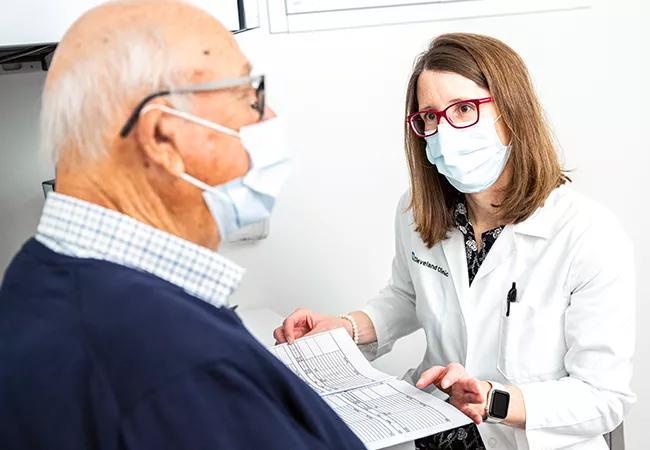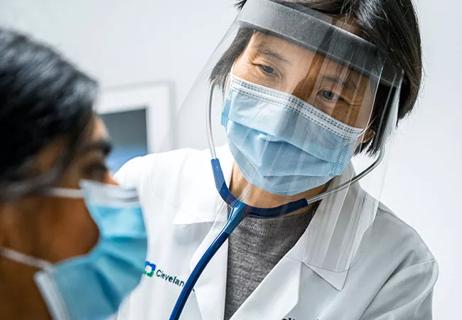
It’s been three years since the announcement of the Advancing American Kidney Health executive order, which defined a framework for policies that aim to transform prevention, diagnosis, and treatment of kidney disease.
Advertisement
Cleveland Clinic is a non-profit academic medical center. Advertising on our site helps support our mission. We do not endorse non-Cleveland Clinic products or services. Policy
Central to this framework is prioritizing the patient. Crystal Gadegbeku, MD, Chair of the Department of Kidney Medicine, says this means empowering and engaging patients to make decisions about treatment modalities for end-stage kidney disease (ESKD). It also means improving access and quality of life for future patients. Here’s a look at what the department is doing to achieve these goals.
In 2022, Dr. Gadegbeku launched the Optimal Transition Program that is designed to smoothly transition patients to ESKD care. The goal is to optimize patient choice and education, and facilitate navigation through the complex process of preparation for the preferred kidney replacement therapy. This program aims to familiarize patients with all therapeutic modalities, facilitate early transplant evaluation and avoid hospitalization for unplanned initiation or “crashing” into dialysis.
Currently, Cleveland Clinic surpasses the national average for patients receiving home hemodialysis therapies at 20% (the national average is 13%), and this program will further enhance home therapeutic opportunities for patients.
Recognizing that the pathway to transplant is not straightforward, even for those who need it the most, Anne Huml, MD, a nephrologist in the Department of Kidney Medicine, launched a pilot study with the goal to simplify the referral process. The project received funding from a Cleveland Clinic Catalyst Grant.
Patients with no contraindications to transplant and who are likely to meet clinical transplant criteria will be automatically referred for transplant evaluation in their electronic medical record, making it an opt–out rather than an opt-in process. They will also track the progress of patients throughout the multistep evaluation process to pinpoint barriers within the system and determine where the drop-off is most likely to occur.
Advertisement
Patient education will help manage expectations about kidney transplant referral and prepare patients for their first visit to the transplant center. Dr. Huml is hopeful the project will improve access, promote timely evaluations, ascertain key barriers, and measure patient and provider perspectives on the process.
Efforts to accelerate therapeutics, devices and biologics to treat kidney disease continue on a national level with the help of KidneyX, a public-private partnership between the U.S. Department of Health and Human Services and the American Society of Nephrology.
John Sedor, MD, a nephrologist in the Department of Kidney Medicine, chairs the steering committee of the competition-based program that awards prizes to high-impact, meritorious proposals. Every KidneyX prize competition defines a problem, without a preconceived notion of what the solution(s) should be, and asks participants to find solutions.
Last year, KidneyX awarded six prizes, two to groups with novel technologies for xenotransplantation. In August 2022, the U.S. Department of Health and Human Services announced an Artificial Kidney Prize competition, which seeks bioartificial kidney prototypes or solutions that address a specific challenge in the development of a functional artificial kidney. The proposals must incorporate science from the domains of regenerative medicine, tissue engineering, systems biology or synthetic biology.
These and other innovations will catalyze the drive for better kidney disease treatments. However, Dr. Sedor says innovation is essential when developing solutions for kidney disease. “We don’t want to wait until the product or device hits the market to have that conversation. There are innovations in the pipeline, and we want ensure they get to the people who need them.”
Advertisement
Advertisement

Predictive modeling, new clinical trials provide a glimpse into the future

Program plays key role in diagnosis and management of genetic kidney diseases

Findings about the tool's utility were presented at the American Society of Nephology’s 2022 Annual Meeting

Pediatric urologists lead quality improvement initiative, author systemwide guideline

Fixed-dose single-pill combinations and future therapies

Reproductive urologists publish a contemporary review to guide practice

Two recent cases show favorable pain and cosmesis outcomes

Meta-analysis assesses outcomes in adolescent age vs. mid-adulthood